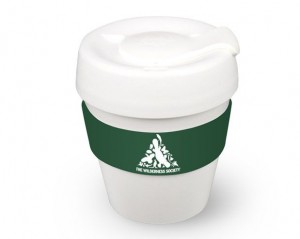The disposable coffee cups that fire today’s convenient coffee culture will soon find a spot in museums together with cave man paintings and dinosaur fossils if Karin de Weille has her way.
De Weille started a drive in Seattle that urges people to kick their paper cup usage habit, and rely more on reusing personal cups in their coffee cup holders.
Sanctioned and supported by the Seattle City Council President, Richard Conlin, this drive encourages people to opt for ceramic mugs instead of paper when they order their drink inside the coffee shops. While on the go, the campaign insists folks whip out their own reusable cups for mochas, which in addition to being environmentally friendly, also keeps the beverage warmer for longer.
Americans go through 56 billion paper cups every year, indicates the International Paper statistics. Did you know that 3 billion paper cups are from coffee giant Starbucks alone? That’ll take quite the PR spin to show big corporations “care” about the environment.
Coffee giant Starbucks is not involved in De Weille’s drive yet, but they have already taken steps to reduce paper cups use and improve recycling process. Currently just less than 2% of the company’s beverages are served in reusable cups. But, as per Starbuck’s website, by 2015 they plan to increase that fraction to 25%.
Due to a thin plastic coating (this helps prevent the cups from turning mushy) the process to recycle the cups is complicated. De Weille said, even if we are able to recycle the cups, tremendous amounts of resources and energy is spent to manufacture and ship these one time cups.
It would takes years to bring about a change in overall culture but psychologists say it just takes about three weeks for a single person to change his or her habits. With this in mind, de Weille launched a platform called New World Habits wherein people can sign up online and undertake a challenge for three weeks. The forum also allows participants to get in touch with others who are involved in the campaign and also chart their progress.
It is actually the rigid three weeks target that people find encouraging, states de Weille. New World Habits also contains guidelines to include several coffee joints and bistros to participate in the drive, rewarding local businesses for being more conscious.
Executive director of Sustainable Seattle, Laura Musikanski said that disposable cups not only come up with a huge price tag but also are a bigger hassle for businesses. Most coffee shops are already giving discounts to people who bring their own cups.
While weaning off the paper cup habit, De Weille said using sticky-note reminders benefited her. Now she always has a cup holster in her backpack and few spare mugs in her car cup holder. She pointed out that anyone can do this and one does not have to be a perfectionist.
Healthy Family | Healthy World

